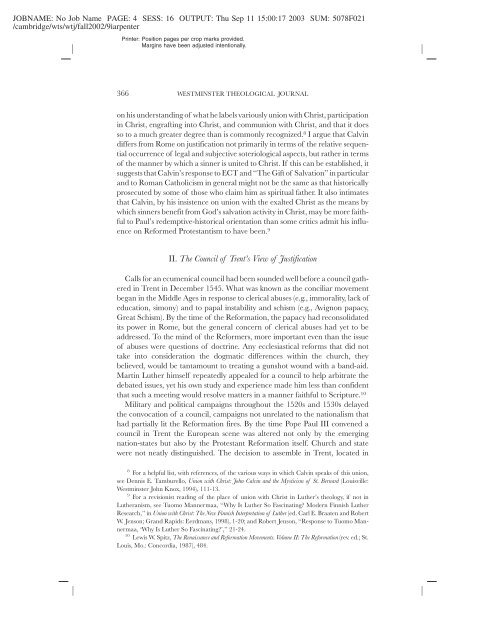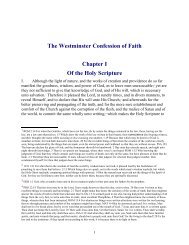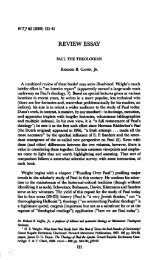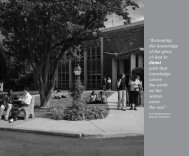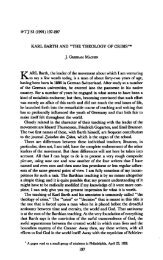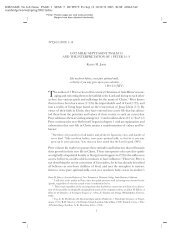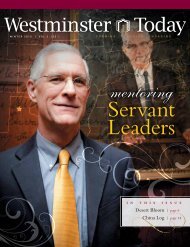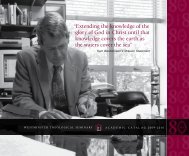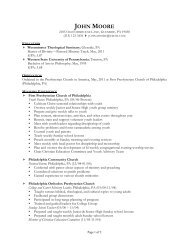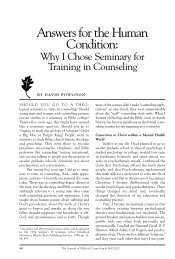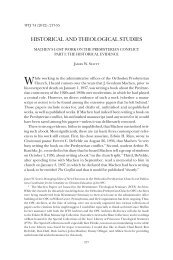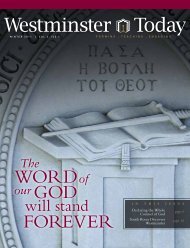A Question of Union with Christ? Calvin and Trent on Justification
A Question of Union with Christ? Calvin and Trent on Justification
A Question of Union with Christ? Calvin and Trent on Justification
You also want an ePaper? Increase the reach of your titles
YUMPU automatically turns print PDFs into web optimized ePapers that Google loves.
JOBNAME: No Job Name PAGE: 4 SESS: 16 OUTPUT: Thu Sep 11 15:00:17 2003 SUM: 5078F021<br />
/cambridge/wts/wtj/fall2002/9ìarpenter<br />
Printer: Positi<strong>on</strong> pages per crop marks provided.<br />
Margins have been adjusted intenti<strong>on</strong>ally.<br />
366 WESTMINSTER THEOLOGICAL JOURNAL<br />
<strong>on</strong> his underst<str<strong>on</strong>g>and</str<strong>on</strong>g>ing <str<strong>on</strong>g>of</str<strong>on</strong>g> what he labels variously uni<strong>on</strong> <str<strong>on</strong>g>with</str<strong>on</strong>g> <str<strong>on</strong>g>Christ</str<strong>on</strong>g>, participati<strong>on</strong><br />
in <str<strong>on</strong>g>Christ</str<strong>on</strong>g>, engrafting into <str<strong>on</strong>g>Christ</str<strong>on</strong>g>, <str<strong>on</strong>g>and</str<strong>on</strong>g> communi<strong>on</strong> <str<strong>on</strong>g>with</str<strong>on</strong>g> <str<strong>on</strong>g>Christ</str<strong>on</strong>g>, <str<strong>on</strong>g>and</str<strong>on</strong>g> that it does<br />
so to a much greater degree than is comm<strong>on</strong>ly recognized. 8 I argue that <str<strong>on</strong>g>Calvin</str<strong>on</strong>g><br />
differs from Rome <strong>on</strong> justificati<strong>on</strong> not primarily in terms <str<strong>on</strong>g>of</str<strong>on</strong>g> the relative sequential<br />
occurrence <str<strong>on</strong>g>of</str<strong>on</strong>g> legal <str<strong>on</strong>g>and</str<strong>on</strong>g> subjective soteriological aspects, but rather in terms<br />
<str<strong>on</strong>g>of</str<strong>on</strong>g> the manner by which a sinner is united to <str<strong>on</strong>g>Christ</str<strong>on</strong>g>. If this can be established, it<br />
suggests that <str<strong>on</strong>g>Calvin</str<strong>on</strong>g>’s resp<strong>on</strong>se to ECT <str<strong>on</strong>g>and</str<strong>on</strong>g> ‘‘The Gift <str<strong>on</strong>g>of</str<strong>on</strong>g> Salvati<strong>on</strong>’’ in particular<br />
<str<strong>on</strong>g>and</str<strong>on</strong>g> to Roman Catholicism in general might not be the same as that historically<br />
prosecuted by some <str<strong>on</strong>g>of</str<strong>on</strong>g> those who claim him as spiritual father. It also intimates<br />
that <str<strong>on</strong>g>Calvin</str<strong>on</strong>g>, by his insistence <strong>on</strong> uni<strong>on</strong> <str<strong>on</strong>g>with</str<strong>on</strong>g> the exalted <str<strong>on</strong>g>Christ</str<strong>on</strong>g> as the means by<br />
which sinners benefit from God’s salvati<strong>on</strong> activity in <str<strong>on</strong>g>Christ</str<strong>on</strong>g>, may be more faithful<br />
to Paul’s redemptive-historical orientati<strong>on</strong> than some critics admit his influence<br />
<strong>on</strong> Reformed Protestantism to have been. 9<br />
II. The Council <str<strong>on</strong>g>of</str<strong>on</strong>g> <str<strong>on</strong>g>Trent</str<strong>on</strong>g>’s View <str<strong>on</strong>g>of</str<strong>on</strong>g> Justificati<strong>on</strong><br />
Calls for an ecumenical council had been sounded well before a council gathered<br />
in <str<strong>on</strong>g>Trent</str<strong>on</strong>g> in December 1545. What was known as the c<strong>on</strong>ciliar movement<br />
began in the Middle Ages in resp<strong>on</strong>se to clerical abuses (e.g., immorality, lack <str<strong>on</strong>g>of</str<strong>on</strong>g><br />
educati<strong>on</strong>, sim<strong>on</strong>y) <str<strong>on</strong>g>and</str<strong>on</strong>g> to papal instability <str<strong>on</strong>g>and</str<strong>on</strong>g> schism (e.g., Avign<strong>on</strong> papacy,<br />
Great Schism). By the time <str<strong>on</strong>g>of</str<strong>on</strong>g> the Reformati<strong>on</strong>, the papacy had rec<strong>on</strong>solidated<br />
its power in Rome, but the general c<strong>on</strong>cern <str<strong>on</strong>g>of</str<strong>on</strong>g> clerical abuses had yet to be<br />
addressed. To the mind <str<strong>on</strong>g>of</str<strong>on</strong>g> the Reformers, more important even than the issue<br />
<str<strong>on</strong>g>of</str<strong>on</strong>g> abuses were questi<strong>on</strong>s <str<strong>on</strong>g>of</str<strong>on</strong>g> doctrine. Any ecclesiastical reforms that did not<br />
take into c<strong>on</strong>siderati<strong>on</strong> the dogmatic differences <str<strong>on</strong>g>with</str<strong>on</strong>g>in the church, they<br />
believed, would be tantamount to treating a gunshot wound <str<strong>on</strong>g>with</str<strong>on</strong>g> a b<str<strong>on</strong>g>and</str<strong>on</strong>g>-aid.<br />
Martin Luther himself repeatedly appealed for a council to help arbitrate the<br />
debated issues, yet his own study <str<strong>on</strong>g>and</str<strong>on</strong>g> experience made him less than c<strong>on</strong>fident<br />
that such a meeting would resolve matters in a manner faithful to Scripture. 10<br />
Military <str<strong>on</strong>g>and</str<strong>on</strong>g> political campaigns throughout the 1520s <str<strong>on</strong>g>and</str<strong>on</strong>g> 1530s delayed<br />
the c<strong>on</strong>vocati<strong>on</strong> <str<strong>on</strong>g>of</str<strong>on</strong>g> a council, campaigns not unrelated to the nati<strong>on</strong>alism that<br />
had partially lit the Reformati<strong>on</strong> fires. By the time Pope Paul III c<strong>on</strong>vened a<br />
council in <str<strong>on</strong>g>Trent</str<strong>on</strong>g> the European scene was altered not <strong>on</strong>ly by the emerging<br />
nati<strong>on</strong>-states but also by the Protestant Reformati<strong>on</strong> itself. Church <str<strong>on</strong>g>and</str<strong>on</strong>g> state<br />
were not neatly distinguished. The decisi<strong>on</strong> to assemble in <str<strong>on</strong>g>Trent</str<strong>on</strong>g>, located in<br />
8 For a helpful list, <str<strong>on</strong>g>with</str<strong>on</strong>g> references, <str<strong>on</strong>g>of</str<strong>on</strong>g> the various ways in which <str<strong>on</strong>g>Calvin</str<strong>on</strong>g> speaks <str<strong>on</strong>g>of</str<strong>on</strong>g> this uni<strong>on</strong>,<br />
see Dennis E. Tamburello, <str<strong>on</strong>g>Uni<strong>on</strong></str<strong>on</strong>g> <str<strong>on</strong>g>with</str<strong>on</strong>g> <str<strong>on</strong>g>Christ</str<strong>on</strong>g>: John <str<strong>on</strong>g>Calvin</str<strong>on</strong>g> <str<strong>on</strong>g>and</str<strong>on</strong>g> the Mysticism <str<strong>on</strong>g>of</str<strong>on</strong>g> St. Bernard (Louisville:<br />
Westminster John Knox, 1994), 111-13.<br />
9 For a revisi<strong>on</strong>ist reading <str<strong>on</strong>g>of</str<strong>on</strong>g> the place <str<strong>on</strong>g>of</str<strong>on</strong>g> uni<strong>on</strong> <str<strong>on</strong>g>with</str<strong>on</strong>g> <str<strong>on</strong>g>Christ</str<strong>on</strong>g> in Luther’s theology, if not in<br />
Lutheranism, see Tuomo Mannermaa, ‘‘Why Is Luther So Fascinating Modern Finnish Luther<br />
Research,’’ in <str<strong>on</strong>g>Uni<strong>on</strong></str<strong>on</strong>g> <str<strong>on</strong>g>with</str<strong>on</strong>g> <str<strong>on</strong>g>Christ</str<strong>on</strong>g>: The New Finnish Interpretati<strong>on</strong> <str<strong>on</strong>g>of</str<strong>on</strong>g> Luther (ed. Carl E. Braaten <str<strong>on</strong>g>and</str<strong>on</strong>g> Robert<br />
W. Jens<strong>on</strong>; Gr<str<strong>on</strong>g>and</str<strong>on</strong>g> Rapids: Eerdmans, 1998), 1-20; <str<strong>on</strong>g>and</str<strong>on</strong>g> Robert Jens<strong>on</strong>, ‘‘Resp<strong>on</strong>se to Tuomo Mannermaa,<br />
‘Why Is Luther So Fascinating’,’’ 21-24.<br />
10 Lewis W. Spitz, The Renaissance <str<strong>on</strong>g>and</str<strong>on</strong>g> Reformati<strong>on</strong> Movements. Volume II: The Reformati<strong>on</strong> (rev. ed.; St.<br />
Louis, Mo.: C<strong>on</strong>cordia, 1987), 484.


